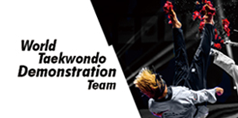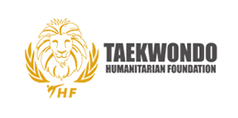BAKU, Azerbaijan (Dec. 12, 2016) – It was the biggest shock of the 2016 Olympic taekwondo competition: The wipeout of the much-fancied Iranian Men’s Team. But just four months later, at the first premier-league taekwondo event to be held since Rio, one of that team’s top guns proved that the Iranians are back in business.
On Day 2 of the World Taekwondo Grand Prix Final in Baku, Iran’s Sajjad Mardani took out Rio silver medalist Abdoul Issoufou of Niger in a fiercely fought semi-final battle, 7-6. That victory thrust him into the final against Russia’s Vladislav Larin.
Game on. Mardani, looking stylish and catlike from the outset, scored with a punch almost immediately. Next, he unleashed a flurry of ax kicks which Larin covered well as both lads fought to control the center of the ring. Larin raised an ax; Mardani stuffed it by moving in and body checking. The feeling-out round ended 1-0 to the Iranian.
In Round 2, Larin looked more aggressive, seizing a point with a check kick to the body that shook Mardani. Mardani shot back with a punch and crescent kick to the head, then a powerful round kick to the head and a serial attack that drove Larin backward. The Iranian fans started cheering, as Mardani grabbed another point to the body.
However, the point difference was minimal: In Round 3, the fight could still go either way. This tense dynamic was sensed by the audience: For the first time in the evening, the crowd started roaring.
Action resumed. Mardani tried punch-round kick combinations. Larin shot back. Mardani nodded in what looked like acknowledgment of his opponent’s attacks. In fact, he had worked out his opponent’s tempo and technique. “I knew than what I needed to do,” he recalled. With one minute left on the clock, Mardani was 3-1 up. The Russian looked set to go into an all-out attack, but Mardani, unfazed, checked his offensive and picked up another point after Larin fell, raising his score to 4-1. Fifteen seconds remained as Mardani moved in close, leaving Larin no space to kick.
But there were still drama to be played out.
In the last three seconds Larin attacked, Mardani backpedaled out of the area and the Russian picked up a point to take the board up to 2-4. Just two seconds remained on the clock. An appeal by the Russian coach provided a break from the action. The Russian and Iranian supporters in the crowd roared. The appeal was rejected. The fighters replaced their mouth guards, buckled on their head protectors and stepped up to the mark. The last two seconds were in play.
Larin surged forward. Mardani counter-kicked and retreated. And that was that. The battle ended 4-3, with a gold medal for the man from Tehran.
After the Olympics, the Grand Prix Final medal earned by Mardani was not just a return to victorious form, but a potent injection of new confidence. “This proved that I could do my best and that my hard work had paid off,” he said. “Now, I can hold my head high.”
So what happened in Rio? The much-feared Iranian trio of Mardani and teammates Farzan Ashourzadeh Fallah and Mahdi Khodabakhshi had been taekwondo’s strongest, medal favorites. When the smoke cleared, all three were empty-handed.
Asked about the drubbing the Team Iran’s men’s squad suffered – issue taekwondo pundits have been discussing ever since - Mardani went quiet.” It’s a tough one,” he mused. “Let me think about it.” After a while he composed himself. “For sure - 100 percent! - the athletes you expect to perform the best are the ones you study more and analyze,” he said. “We were the favorites, so I believe people studied us.”
The stress was particularly colossal for heavyweight Mardani, who, fought on the last day of the competition. “I was under a ton of pressure heading into my day as the two favorites [his two team mates] have been unsuccessful,” he said. “That fact that I was unable to win as well was so painful. We were in disbelief.”
Since then Mardani has been on an obsessive self-improvement drive. “You have to adjust and change and adapt - the person who remains the same is not successful in any sport,” he said. “I have tried to focus on changing my game.”
The Grand Prix Final gold suggests his efforts have borne fruit. “I have never seen Mardani look as good as he did in Baku,” said an impressed Mike McKenzie, the WTF’s TV commentator.
Now 28, Mardani started taekwondo after seeing his mother and sister practice. “As soon as I saw taekwondo, I fell in love with it,” he said. As a fighter, he reckons his strengths are his non-specialized approach to the game. “I believe I am well-rounded,” he said. His favorite technique is the head attack, but he does not name any specific kick. “The leg goes from here to there!” he said, gesturing from earth to sky.
Asked to name his favorite fighter, his response is telling. “I like Jade Jones,” he said. “She believes in herself.”
Unlike some of the Iranian athletes who live, eat and breathe taekwondo, taekwondo and only taekwondo, Mardani has a side job: fashion modeling.
That should surprise absolutely nobody. As well as boasting the height of the heavyweights and the toned physique of the pro athlete, Mardani is far and away the most wickedly handsome devil in the game. “I like modeling, I like being on billboards,” he said. “I love it! One day I want to go out and be a full time model.”
He thought for a second, then added, “And if I get the chance to be a model, it would be a great opportunity for taekwondo, too!”
For now, his own goals focus on 2020 – though he is keeping his eyes on the near term. “Obviously, the goal is Tokyo, but I am focusing on day-by-day and only looking to the next competition,” he said.
Mardani’s focus on constant improvement suggests that he might be better advised to ditch modeling and become a motivational speaker.
“My goal is to show anyone around me that hard work pays off,” he said. “I want to influence the people who surround me to always believe in themselves: It does not matter how difficult life becomes, you always want to achieve more - day by day you get smarter and stronger.”
Despite his relative youth, Mardani is already thinking about his heritage. “Sajjad Mardani is a human like everybody else, but I have blessed by God with so many things,” he said. “The main thing is to make an impression, and to inspire others.”
Armed with this attitude, Team Iran’s Rio experience may even prove to be a long-term positive. “In sport, one person wins, one person loses: We did not perform as well as we wanted, but that’s life,” Mardani said. “We look forward to tomorrow.”



































